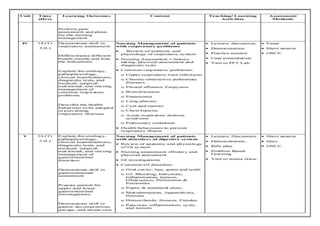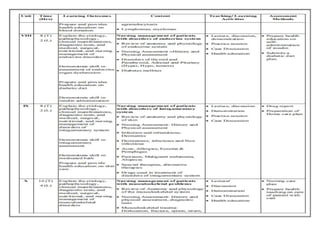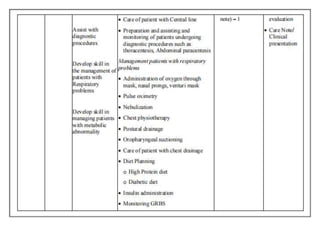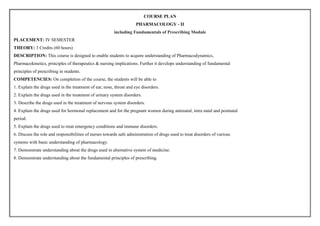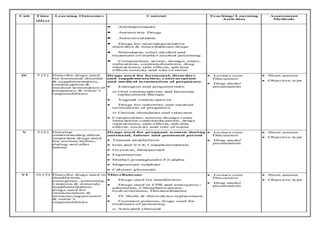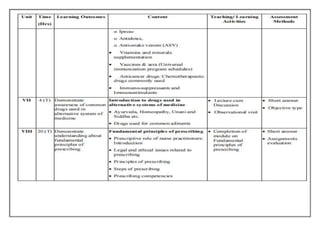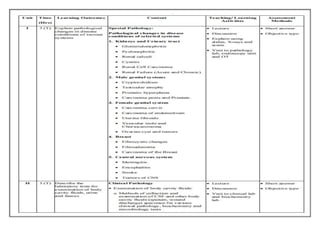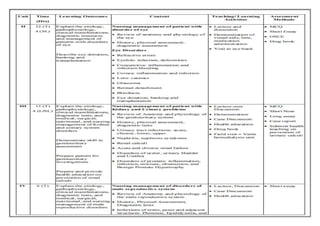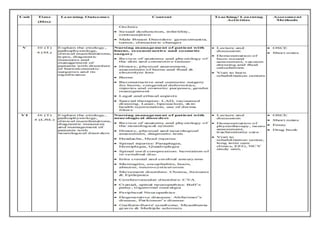COURSE PLAN.docx
- 1. COURSE PLAN APPLIED MICROBIOLOGY THEORY: 20 hours PRACTICAL: 20 hours (Lab/Experiential Learning – L/E) DESCRIPTION: This course is designed to enable students to acquire understanding of fundamentals of Microbiology, compare and contrast different microbes and comprehend the means of transmission and control of spread by various microorganisms. It also provides opportunities for practicing infection control measures in hospital and community settings. COMPETENCIES: On completion of the course, the students will be able to: 1. Identify the ubiquity and diversity of microorganisms in the human body and the environment. 2. Classify and explain the morphology and growth of microbes. 3. Identify various types of microorganisms. 4. Explore mechanisms by which microorganisms cause disease. 5. Develop understanding of how the human immune system counteracts infection by specific and non-specific mechanisms. 6. Apply the principles of preparation and use of vaccines in immunization. 7. Identify the contribution of the microbiologist and the microbiology laboratory to the diagnosis of infection.
- 4. COURSE PLAN INFECTION CONTROL & SAFETY THEORY: 20 hours PRACTICAL/LAB: 20 hours (Lab/Experiential Learning – L/E) DESCRIPTION: This course is designed to help students to acquire knowledge and develop competencies required for fundamental patient safety and infection control in delivering patient care. It also focuses on identifying patient safety indicators, preventing and managing hospital acquired infections, and in following universal precautions. COMPETENCIES: The students will be able to: 1. Develop knowledge and understanding of Hospital acquired Infections (HAI) and effective practices for prevention. 2. Integrate the knowledge of isolation (Barrier and reverse barrier) techniques in implementing various precautions. 3. Demonstrate and practice steps in Hand washing and appropriate use of different types of PPE. 4. Illustrate various disinfection and sterilization methods and techniques. 5. Demonstrate knowledge and skill in specimen collection, handling and transport to optimize the diagnosis for treatment. 6. Incorporate the principles and guidelines of Bio Medical waste management. 7. Apply the principles of Antibiotic stewardship in performing the nurses‘ role. 8. Identify patient safety indicators and perform the role of nurse in the patient safety audit process. 9. Apply the knowledge of International Patient Safety Goals (IPSG) in the patient care settings. 10. Identify employee safety indicators and risk of occupational hazards. 11. Develop understanding of the various safety protocols and adhere to those protocols.
- 9. COURSE PLAN PHARMACOLOGY - I PLACEMENT: III SEMESTER THEORY: 1 Credit (20 hours) DESCRIPTION: This course is designed to enable students to acquire understanding of Pharmacodynamics, Pharmacokinetics, principles of therapeutics and nursing implications. COMPETENCIES: On completion of the course, the students will be able to 1. Describe pharmacodynamics and pharmacokinetics. 2. Review the principles of drug calculation and administration. 3. Explain the commonly used antiseptics and disinfectants. 4. Describe the pharmacology of drugs acting on the GI system. 5. Describe the pharmacology of drugs acting on the respiratory system. 6. Describe drugs used in the treatment of cardiovascular and blood disorders. 7. Explain the drugs used in the treatment of endocrine system disorders. 8. Describe the drugs acting on skin and drugs used to treat communicable diseases.
- 13. COURSE PLAN PATHOLOGY - I PLACEMENT: III SEMESTER THEORY: 1 Credit (20 hours) (includes lab hours also) DESCRIPTION: This course is designed to enable students to acquire knowledge of pathology of various disease conditions, understanding of genetics, its role in causation and management of defects and diseases and to apply this knowledge in practice of nursing. COMPETENCIES: On completion of the course, the students will be able to 1. Apply the knowledge of pathology in understanding the deviations from normal to abnormal pathology. 2. Rationalize the various laboratory investigations in diagnosing pathological disorders. 3. Demonstrate the understanding of the methods of collection of blood, body cavity fluids, urine and faces for various tests. 4. Apply the knowledge of genetics in understanding the various pathological disorders. 5. Appreciate the various manifestations in patients with diagnosed genetic abnormalities. 6. Rationalize the specific diagnostic tests in the detection of genetic abnormalities. 7. Demonstrate the understanding of various services related to genetics.
- 16. COURSE PLAN ADULT HEALTH NURSING - I WITH INTEGRATED PATHOPHYSIOLOGY (including BCLS module) PLACEMENT: III SEMESTER THEORY: 7 Credits (140 hours) PRACTICUM: Lab/Skill Lab (SL) – 1 Credit (40 hours) Clinical – 6 Credits (480 hours) DESCRIPTION: This course is designed to equip the students to review and apply their knowledge of Anatomy, Physiology, Biochemistry and Behavioral sciences in caring for adult patients with Medical/Surgical disorders using nursing process approach and critical thinking. It also intends to develop competencies required for assessment, diagnosis, treatment, nursing management, and supportive/palliative care to patients with various Medical Surgical disorders. COMPETENCIES: On completion of Medical Surgical Nursing I course, students will be able to 1. Explain the etiology, pathophysiology, manifestations, diagnostic studies, treatments and complications of common medical and surgical disorders. 2. Perform complete health assessment to establish a data base for providing quality patient care and integrate the knowledge of anatomy, physiology and diagnostic tests in the process of data collection. 3. Identify nursing diagnoses, list them according to priority and formulate nursing care plan. 4. Perform nursing procedures skillfully and apply scientific principles while giving comprehensive nursing care to patients. 5. Integrate knowledge of pathology, nutrition and pharmacology in caring for patients experiencing various medical and surgical disorders. 6. Identify common diagnostic measures related to the health problems with emphasis on nursing assessment and responsibilities. 7. Demonstrate skill in assisting/performing diagnostic and therapeutic procedures. 8. Demonstrate competencies/skills to patients undergoing treatment for medical surgical disorders. 9. Identify the drugs used in treating patients with medical surgical conditions. 10. Plan and give relevant individual and group education on significant medical surgical topics.
- 23. COURSE PLAN CLINICAL PRACTICUM CLINICAL PRACTICUM: 6 Credits (480 hours) - 18 weeks × 27 hours PRACTICE COMPETENCIES: On completion of the clinical practicum, the students will be able to apply nursing process and critical thinking in delivering holistic nursing care including rehabilitation to the adult patients undergoing surgery, with shock and fluid and electrolyte imbalance and with selected medical & surgical conditions i.e., Gastrointestinal, Respiratory, Endocrine, Orthopaedic, Dermatology and Cardiovascular disorders. The students will be competent to: 1. Utilize the nursing process in providing care to the sick adults in the hospital: a. Perform complete health assessment to establish a data base for providing quality patient care. b. Integrate the knowledge of diagnostic tests in the process of data collection. c. Identify nursing diagnoses and list them according to priority. d. Formulate nursing care plan, using problem solving approach. e. Apply scientific principles while giving nursing care to patients. f. Perform nursing procedures skilfully on patients. g. Establish/develop interpersonal relationship with patients and family members. h. Evaluate the expected outcomes and modify the plan according to the patient needs. 2. Provide comfort and safety to adult patients in the hospital. 3. Maintain safe environment for patients during hospitalization. 4. Explain nursing actions appropriately to the patients and family members. 5. Ensure patient safety while providing nursing procedures. 6. Assess the educational needs of the patient and their family related to medical and surgical disorders and provide appropriate health education to patients. 7. Provide pre, intra and post-operative care to patients undergoing surgery. 8. Integrate knowledge of pathology, nutrition and pharmacology for patients experiencing various medical and surgical disorders. 9. Integrate evidence-based information while giving nursing care to patients. 10. Demonstrate the awareness of legal and ethical issues in nursing practice.
- 24. I. NURSING MANAGEMENT OF PATIENTS WITH MEDICAL CONDITIONS A. Skill Lab Use of manikins and simulators Intravenous therapy Oxygen through mask Oxygen through nasal prongs Venturi mask Nebulization Chest physiotherapy B. Clinical Postings
- 26. II. NURSING MANAGEMENT OF PATIENTS WITH SURGICAL CONDITIONS A. Skill Lab Use of manikins and simulators Nasogastric aspiration Surgical dressing Suture removal Colostomy care/ileostomy care Enteral feeding B. Clinical Postings
- 27. III. NURSING MANAGEMENT OF PATIENTS WITH CARDIAC CONDITIONS A. Skill Lab Use of manikins and simulators Cardiovascular assessment Interpreting ECG BLS/BCLS CPR ABG analysis Taking blood sample Arterial blood gas analysis – interpretation B. Clinical Postings
- 29. IV. NURSING MANAGEMENT OF PATIENTS WITH DISORDERS OF INTEGUMENTARY SYSTEM A. Skill Lab Use of manikins and simulators Application of topical medication B. Clinical Postings V. NURSING MANAGEMENT OF PATIENTS WITH COMMUNICABLE DISEASES A. Skill Lab Barrier Nursing Reverse Barrier Nursing Standard precautions B. Clinical Postings
- 30. VI. NURSING MANAGEMENT OF PATIENTS WITH MUSCULOSKELETAL PROBLEMS A. Skill Lab Use of manikins and simulators Range of motion exercises Muscle strengthening exercises Crutch walking B. Clinical Postings
- 31. COURSE PLAN PHARMACOLOGY - II including Fundamentals of Prescribing Module PLACEMENT: IV SEMESTER THEORY: 3 Credits (60 hours) DESCRIPTION: This course is designed to enable students to acquire understanding of Pharmacodynamics, Pharmacokinetics, principles of therapeutics & nursing implications. Further it develops understanding of fundamental principles of prescribing in students. COMPETENCIES: On completion of the course, the students will be able to 1. Explain the drugs used in the treatment of ear, nose, throat and eye disorders. 2. Explain the drugs used in the treatment of urinary system disorders. 3. Describe the drugs used in the treatment of nervous system disorders. 4. Explain the drugs used for hormonal replacement and for the pregnant women during antenatal, intra natal and postnatal period. 5. Explain the drugs used to treat emergency conditions and immune disorders. 6. Discuss the role and responsibilities of nurses towards safe administration of drugs used to treat disorders of various systems with basic understanding of pharmacology. 7. Demonstrate understanding about the drugs used in alternative system of medicine. 8. Demonstrate understanding about the fundamental principles of prescribing.
- 35. COURSE PLAN PATHOLOGY - II AND GENETICS PLACEMENT: IV SEMESTER THEORY: 1 Credit (20 hours) (Includes lab hours also) DESCRIPTION: This course is designed to enable students to acquire knowledge of pathology of various disease conditions, understanding of genetics, its role in causation and management of defects and diseases and to apply this knowledge in practice of nursing. COMPETENCIES: On completion of the course, the students will be able to 1. Apply the knowledge of pathology in understanding the deviations from normal to abnormal pathology 2. Rationalize the various laboratory investigations in diagnosing pathological disorders 3. Demonstrate the understanding of the methods of collection of blood, body cavity fluids, urine and feces for various tests. 4. Apply the knowledge of genetics in understanding the various pathological disorders 5. Appreciate the various manifestations in patients with diagnosed genetic abnormalities 6. Rationalize the specific diagnostic tests in the detection of genetic abnormalities. 7. Demonstrate the understanding of various services related to genetics.
- 38. GENETICS
- 40. ADULT HEALTH NURSING - II WITH INTEGRATED PATHOPHYSIOLOGY including Geriatric Nursing AND PALLIATIVE CARE MODULE PLACEMENT: IV SEMESTER THEORY: 7 Credits (140 hours) PRACTICUM: Lab/Skill Lab (SL): 1 Credit (40 hours) Clinical: 6 Credits (480 hours) DESCRIPTION: This course is designed to equip the students to review and apply their knowledge of Anatomy, Physiology, Biochemistry and Behavioural sciences in caring for adult patients with Medical/Surgical disorders using nursing process approach. It also intends to develop competencies required for assessment, diagnosis, treatment, nursing management, and supportive/palliative and rehabilitative care to adult patients with various Medical Surgical disorders. COMPETENCIES: On completion of the course the students will apply nursing process and critical thinking in delivering holistic nursing care with selected Medical and Surgical conditions. At the completion of Adult Health Nursing II course, students will 1. Explain the etiology, pathophysiology, manifestations, diagnostic studies, treatments and complications of selected common medical and surgical disorders. 2. Perform complete health assessment to establish a data base for providing quality patient care and integrate the knowledge of diagnostic tests in the process of data collection. 3. Identify diagnoses, list them according to priority and formulate nursing care plan. 4. Perform nursing procedures skilfully and apply scientific principles while giving comprehensive nursing care to patients. 5. Integrate knowledge of anatomy, physiology, pathology, nutrition and pharmacology in caring for patients experiencing various medical and surgical disorders. 6. Identify common diagnostic measures related to the health problems with emphasis on nursing assessment and responsibilities. 7. Demonstrate skill in assisting/performing diagnostic and therapeutic procedures. 8. Demonstrate competencies/skills to patients undergoing treatment for medical surgical disorders. 9. Identify the drugs used in treating patients with selected medical surgical conditions. 10. Plan and provide relevant individual and group education on significant medical surgical topics. 11. Maintain safe environment for patients and the health care personnel in the hospital.
- 47. COURSE PLAN CLINICAL PRACTICUM CLINICAL PRACTICUM: 6 Credits (480 Hours) – 20 weeks × 24 hours PRACTICE COMPETENCIES: On completion of the clinical practicum, the students will develop proficiency in applying nursing process and critical thinking in rendering holistic nursing care including rehabilitation to the adult/geriatric patients admitted in Critical Care Units, undergoing cosmetic and reconstructive surgery and with selected medical & surgical disorders of ear, nose, throat, eye, Genitourinary, reproductive, immunologic, nervous systems and in emergency/disaster conditions. The students will be competent to 1. Utilize the nursing process in providing care to the sick adults in the hospital a. Perform complete health assessment to establish a data base for providing quality patient care. b. Integrate the knowledge of diagnostic tests in patient assignment. c. Identify nursing diagnoses and list them according to priority. d. Formulate nursing care plan, using problem solving approach. e. Apply scientific principles while giving nursing care to patients. f. Develop skill in performing nursing procedures applying scientific principle. g. Establish/develop interpersonal relationship with patients and family members. h. Evaluate the expected outcomes and modify the plan according to the patient needs. 2. Provide comfort and safety to adult patients in the hospital. 3. Maintain safe environment for patients during hospitalization. 4. Explain nursing actions appropriately to the patients and family members. 5. Ensure patient safety while providing nursing procedures. 6. Assess the educational needs of the patient and their family related to medical and surgical disorders and provide appropriate health education to patients. 7. Provide pre, intra and post-operative care to patients undergoing surgery. 8. Integrate knowledge of pathology, nutrition and pharmacology for patients experiencing selected medical and surgical disorders.
- 48. I. Nursing Management of Patients with ENT Disorders A. Skill Lab Use of manikins and simulators Tracheostomy care Instilling Ear and Nasal medications Bandage application B. Clinical Postings
- 49. II. Nursing Management of Patients with Eye Conditions A. Skill Lab Use of manikins and simulators Instilling Eye medications Eye irrigation Eye bandage B. Clinical Postings
- 50. III. Nursing Management of Patients with Kidney and Urinary System Disorders A. Skill Lab Use of manikins and simulators Assessment: kidney & urinary system Preparation: dialysis Catheterization and care B. Clinical Postings
- 51. IV. Nursing Management of Patients with Burns and Reconstructive Surgery A. Skill Lab Use of manikins and simulators Assessment of burns wound Wound dressing B. Clinical Postings
- 52. V. Nursing Management of Patients with neurological disorders A. Skill Lab Use of manikins and simulators Range of motion exercises Muscle strengthening exercises Crutch walking B. Clinical Postings
- 53. VI. Nursing Management of Patients with Immunological Disorders A. Skill Lab Barrier Nursing Reverse Barrier Nursing B. Clinical Postings
- 57. PROFESSIONALISM, PROFESSIONAL VALUES & ETHICS INCLUDING BIOETHICS PLACEMENT: IV SEMESTER THEORY: 1 Credit (20 hours) DESCRIPTION: This course is designed to help students to develop an understanding of professionalism and demonstrate professional behavior in their workplace with ethics and professional values. Further the students will be able to identify ethical issues in nursing practice and participate effectively in ethical decision making along with health team members. COMPETENCIES: On completion of this course, the students will be able to 1. Describe profession and professionalism. 2. Identify the challenges of professionalism. 3. Maintain respectful communication and relationship with other health team members, patients and society. 4. Demonstrate professional conduct. 5. Describe various regulatory bodies and professional organizations related to nursing. 6. Discuss the importance of professional values in patient care. 7. Explain the professional values and demonstrate appropriate professional values in nursing practice. 8. Demonstrate and reflect on the role and responsibilities in providing compassionate care in the healthcare setting. 9. Demonstrate respect, human dignity and privacy and confidentiality to self, patients and their caregivers and other health team members. 10. Advocate for patients‘ wellbeing, professional growth and advancing the profession. 11. Identify ethical and bioethical concerns, issues and dilemmas in nursing and healthcare. 12. Apply knowledge of ethics and bioethics in ethical decision making along with health team members. 13. Protect and respect patient‘s rights.



















